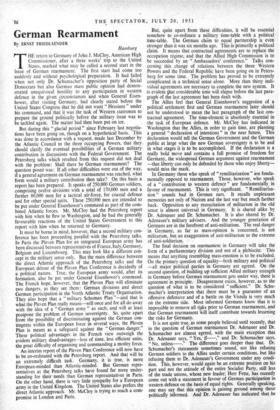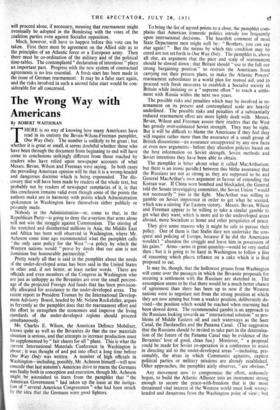German Rearmament
By ERNST FRIEDLAENDER Hamburg HE return to Germany of John J. McClo', American High Commissioner, after a three weeks' trip to the United States, marked what may be called a second start in the issue of German rearmament. The first start had come too suddenly and without psychological preparation. It had failed when not only Dr. Schumacher's opposition party of Social Democrats but also German mass public opinion had demon- strated unequivocal hostility to 4ny participation in western defence in the given circumstances and when General Eisen- hower, after visiting *Germany, had clearly stated before the United States Congress that he did not want " Hessians " under his command, and that it was the task of Western statesmen to, prepare the ground politically before the military issue was to be tackled again. The matter had then been put on ice.
But during this " glacial period " since February last negotia- tions have been going on, though on a hypothetical basis. This was done in accordance with a request, made last December by the Atlantic Council to the three occupying Powers, that they. should clarify the eventual possibilities of a German military contribution in discussions with the Federal Government. The Petersberg talks which resulted from this request did not deal with the problem: Shall there be German rearmament? The question posed was : If all other difficulties were out of the way, if a general agreement on German rearmament was reached, what form would a military contribution then take? On this basis a report has been prepared. It speaks of 250,000 German soldiers, comprising twelve divisions with a total of 170,000 men and a further 80,000 men for a tactical air-force, for coastal defence and for other special units. These 250,000 men are intended to be put under General Eisenhower's command as part of the com- bined Atlantic forces. Mr. McCloy had the Petersberg report with him when he flew to Washington, and he had the generally favourable reactions of the United States Government to this report with him when he returned to Germany.
It must be borne in mind, however, that a second military con- ference has been proceeding parallel with the Petersberg talks. In Paris the Pleven Plan for an integrated European army has been discussed between representatives of France,Italy,Germany, Belgium and Luxembourg. This may look like a different con- cept in the military sense only. But the main diffetence between the direct Atlantic approach of the Petersberg talks and the European detour of the Pleven Plan Conference is decidedly of a political nature. True, the European army would, after its formation, also be put under General Eisenhower's command. The French hope, however, that the Pleven Plan will eliminate two dangers, as they see them: German divisions and direct German participation in the North Atlantic Treaty Organisation. They also hope that a " military Schuman Plan "—and that is what the Pleven Plan really means—will once and for all do away with the idea of a " German army " as such, and will at least postpone the problem of German sovereignty. So, quite apart from the possibility of discriminating against the German con- tingents within the European force in several ways, the Pleven Plan is meant as a safeguard against the " German danger." These political advantages in the french view outweigh the evident military disadvantages—loss of time, less efficient units, the great difficulty of organising and commanding a motley force. An interim report of the Pleven Plan Conference will now have to be co-ordinated with the Petersberg report. And that will be an extremely difficult task. Germany, it is true, is more European-minded than Atlantic-minded. But German repre- sentatives at the Petersberg talks have found far more under- standing for their -needs than German representatives in Paris. On the other hand, there is very little sympathy for a European army in the United Kingdom. The United States also prefers the direct Atlantic approach. Mr. McCloy is trying to reach a com- promise in London and Paris. • But, quite apart from these difficulties, it will be essential somehow to co-ordinate a military time-table with a political time-table. The German claim to equal partnership is even stronger than it was six months ago. This is primarily a political claim. It means that contractual agreements are to replace the occupation regime, and that the Allied High-Commission is to be succeeded by an " Ambassadors' conference." Talks con- cerning this change of relations between the three Western Powers and the Federal Republic. have been going on in Peters- berg for some time. The problem has proved to be extremely complicated in a technical sense alone. More than thirty indi- vidual agreements are necessary to complete the new system. It is evident that considerable time will elapse before the last para- graph of the last agreement had been dealt with.
The Allies feel that General Eisenhower's suggestion of a political settlement first and German rearmament later should not be understood to mean the last paragraph of the last con- tractual agreement. The time-element is absolutely essential in the task of European defence. Mr. McCloy has indicated in Washington that the Allies, in order to gain time, are planning a general " declaration of intentions " in the near future. This declaration would tell the German Government and the German public at large what the new German sovereignty is to be and in what stages it is to be accomplished. If the declaration is a really bold move and contains a full promise of freedom for Germany, the widespread German argument against rearmament —that liberty can only be defended by those who enjoy liberty— would miss the mark.
In Germany those who speak of " remilitarisation " are funda- mentally opposed to rearmament. Those, however, who speak of a " contribution to western defence " are fundamentally., in favour of rearmament. This is very significant. " Remilitarisa- tion " sounds bad in German ears. It recalls unpleasant memories not only of Nazism and the last war but much farther back. Opposition to any resuscitation of militarism in the old sense is almost universal in Germany. It is shared alike by Dr. Adenauer and Dr. Schumacher. It is also shared by Dr. Adenauer's military advisers. And the younger generation of Germans are in the forefront of anti-militarism. The real danger in Germany, as far as mass-opinion is *concerned, is not militarism, but an exaggeration of anti-militarism to the extreme of anti-soldierism. - - The final decision on rearmament in Germany will take the form of a parliamentary division and not of a plebiscite. This means that anything resembling mass-emotion is to be excluded. On the prhnary question of equality—both military and political major political parties in Germany are agreed. On the second question, of building up sufficient Allied military strength in Germany before German rearmament gets under way, there is agreement in principle. Disagreement exists, however, as to the question of what is to be considered " sufficient." Dr. Schu- macher's interpretation that there must be a guarantee of an offensive defensive and of a battle on the Vistula is very much on the extreme side. Most informed Germans know that it is impossible to remove all risks prior to German rearmament, and that German rearmament will itself contribute towards lessening the risks for Germany.
It is not quite true, as some people believed until recently, that in the question of German rearmament Dr. Adenauer and Dr. Schumacher are almost agreed, with the main exception that Dr. Adenauer says, " Yes, if—," and Dr. Schumacher says, " No, unless—." The difference goes deeper than that. Dr. Schumacher's statements sometimes sound, not like refusing German soldiers to the Allies under certain conditions, but like refusing them to Dr. Adenauer's Government under any condi- tion. This, however, would again be an extreme position on his part and not the attitude of the entire Socialist Party, still less of the trade unions, whose new leader, Herr Fette, has recently come out with a statement in favour of German participation in western defence on the basis of equal rights. Generally speaking, one may say that this opinion is gaining ground among those politically informed. And Dr. Adenauer has indicated that he will proceed alone, if necessary, meaning that rearmament might eventually be adopted in the Bundestag with the votes of the coalition parties even against Socialist opposition.
Much, however, will have to happen before this vote can be taken. First there must be agreement on the Allied side as to the principles of an Atlantic force or a European army. Then there must be co-ordination of the military and of the political time-tables. The contemplated " declaration of intentions " plays an important part. Progress with the new system of contractual ,agreements is no less essential. A fresh start has been made in the issue of German rearmament. It may be a false start again, and the risks involved in such a second false start would be con- siderable for all concerned.



































 Previous page
Previous page